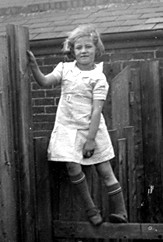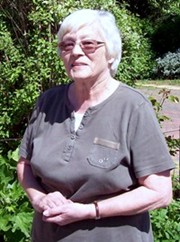|
Memories of
a railway
childhood
by PAMELA BINNS
1934-2010
This is really
the life story of my father, Percy Herbert Craske, who was
born at Aylsham, Norfolk, on 14th September 1906, the eldest of seven
children, although there were also three others who died in infancy, and
living in Chestnut Terrace at Sutton Bridge in South Lincolnshire. He told
me he always wanted to join the Royal Navy but was not allowed to because
the money he earned was needed to keep the home going.
The family were closely connected to the railways. His father was a
signalman and Dad was a porter at the time of his marriage to Mum, Gladys
May Cheney, in 1930. Her father was listed as a railway servant on the
marriage certificate and he was also a lay preacher. We often wondered if
there was any connection with Dick Cheney, the American vice-president
under George Bush, and there might have been because grandpa’s brother
emigrated to Canada and after all, the name is unusual.
Dad was eventually appointed stationmaster at Counter Drain in the late
1930s. This was a small station out in the fens which had opened way back
in 1866 on the Bourne to Spalding railway line which had just five
stations, namely Bourne, Twenty, Counter Drain, Pode Hole and Spalding,
and serving mainly Tongue End and the surrounding farms. He was
responsible for the upkeep of the station and dealing with the goods and
passenger trains that stopped there.
I was about five at the time and on one occasion I was allowed to ride on
the engine from the platform to the goods yard. No Health and Safety
regulations in those days. I also regularly visited the gatehouse where I
was often allowed to help with the levers for the signals and other
equipment.
The station house has now completely gone. When we lived there it was
without any modern amenities such as gas and electricity and this meant
oil lamps and candles at bedtime. Our drinking water came in milk churns
by train and our only luxury was the wireless with the accumulator man
calling regularly to bring us a new one to keep it up and running.
As we lived in such an isolated place, learning to ride a bike was a
necessity. We were about a mile away from Tongue End village and my
nearest friend lived at a farm half a mile away. Unfortunately learning to
cycle resulted in several lacerated knees which saw me all dressed up in
Sunday best for the chapel anniversary but with bandaged legs.
|
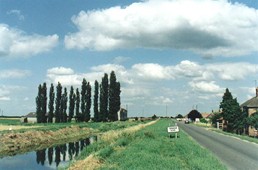 |
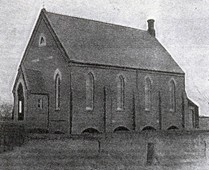 |
|
Tongue End village and the
chapel which was demolished circa 1960. |
The non-conformist chapel was situated the other side of the river at
Tongue End which meant quite a journey every Sunday but we attended
regularly. The school was also there with the teacher travelling in by
train from Spalding each day. We had one very bad winter while living
there and conditions meant a mile-long battle through deep snow to get to
lessons. A special treat was being given a big chocolate coin in gold foil
for bravery over having a vaccination. I cannot remember what for but it
was probably for smallpox. Dad was also involved in amateur dramatics
which were held at the school at that time.
The Second World War broke out in 1939 whilst we were living there and we
had a mother and baby billeted with us after being evacuated from London
to escape the blitz but she could not stand what she described as “living
in the back of beyond” and soon decided to return home. We did not
escape the war in Counter Drain either and I remember we children were
fascinated by visiting a huge crater which appeared overnight in one of
the fields caused by a stray bomb that had been intended for Spalding
station.
In 1941, we moved to Bourne and our home became rooms in South Street at a
house on the double bend owned by the Coopers although Mr Cooper was
serving in the army. It was a bit scary living so close to a dangerous
road because troop convoys often thundered past our bay window a little
too close for comfort. Across the road was Brook Lodge, Dr George
Holloway’s home and surgery, and next door a small farm owned by the Grays,
now demolished to make way for new houses.
While living there we witnessed the Eastgate plane crash one night in May
1941 and saw the German bomber passing overhead on fire before coming down
on to the Butcher‘s Arms, killing eight people. Next door were the Wones
family who had a Morrison shelter in the house so we children spent many
nights sleeping in that, a huge metal structure with wire mesh sides which
served as a table during the day and a shelter at night. Winter fun
included skating and sliding on flooded frozen fields next to the Red Hall
with the Gelsthorpe family then living at Cavalry House across the road.
Dad was now assistant stationmaster at Bourne and the booking office was
then at the Red Hall. My school was the Abbey Road Primary in Abbey Road
also attended by many children who had been evacuated from Hull, together
with a teacher who remained in Bourne after the war and became Mrs Scotney.
Everyone was issued with a gas mask which we had to collect from a central
distribution point where it was specially fitted and we were instructed to
always carry it with us wherever we went although I do not remember ever
having to wear it.
Later we moved to a house at the junction of Austerby and Willoughby Road,
originally a large property and divided into two, the other half being
occupied by the Bloodworth family. Apparently it was formerly occupied by
one of the town’s veterinary surgeons with the coachman’s quarters across
the yard, now used as a washhouse. There was a paddock for the horses and
stables, now replaced by bungalows, and a spring of icy cold water. There
was no water in the house so every drop had to be bucketed from the spring
which was quite a chore on washdays and bath nights.
|
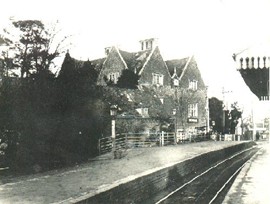 |
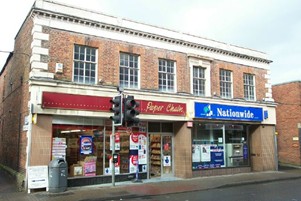 |
|
The Red Hall when it was being
used as the railway booking office and the former Co-op shop
premises in North Street with the public hall above. |
The toilet was shared and located down the yard, an earth closet with two
adult seats and one for a child although I cannot remember any communal
family visits. Unfortunately, the contents had to be emptied twice a year
by my father and Mr Bloodworth, a task which became a cue to the
neighbours for closed doors and windows due to the smell but we did grow
some astounding vegetables. Next door was the Sandalls’ house which was
also a bakery and shop and rumoured to have a secret underground passage
to the church although we never found it.
Dad became a member of the Home Guard during the war and he occasionally
brought home a soldier for the night who had been stranded at Bourne
station. He was also appointed secretary of Bourne Town Football Club, an
association that lasted many years, and he joined Bourne Town Band,
playing the big drum.
Practices were held in the hall above the Peterborough Co-operative
Society store in North Street, now used by Paper Chain and the Nationwide
Building Society, but in those days it was a two part shop, half selling
groceries and the other half drapery, the two divided by a cash kiosk
which received money from the counters by way of metal containers sent
whizzing across the room on overhead wires, a system popular in large
shops at that time.
The football club ran Saturday night dances at the Corn Exchange in those days,
strictly supervised with no alcohol sold and so pass-outs were issued for
the interval but with Dad on the door and Mum on refreshments there was no
chance for me to pop out anyway. But these social occasions were lucky for
me because it was here that I got together with my future husband who had
just returned from doing his two years’ National Service with the Royal
Air Force Regiment.
In September 1944, the lads of the 1st Battalion, the Parachute Regiment,
who had been stationed in Bourne for the previous ten months preparing for
the Battle of Arnhem, left and I vividly remember seeing all the planes
going over on their way to the Netherlands with the troops on board. Not
all of them survived but one who did later became my brother in law,
having been captured and taken prisoner but came home when the war ended
and married my husband's sister.
During this time Dad was a great influence on me, teaching me to play
cards and instilling in me a lifelong love of reading. I had managed to
pass the entrance examination and get a place at Bourne Grammar School and
I know that this meant financial sacrifices for him and my mother for
although an examination pass allowed me to attend the school without
paying fees, there were many extra expenses involved such as uniforms,
sports equipment and other necessary sundries.
These soon added up, especially after the first year when the old
headmaster, Charles Pask Matthews, retired and his successor, Reginald
Foster, decided to change the colour of the school uniforms from black to
green. The school at that time consisted of old wooden army huts arranged
in an H shape, one side was classrooms and the other laboratory, woodwork,
cookery and other practical subjects with a small museum in the middle.
The winter of 1947 was particularly severe with deep snowfalls affecting
all parts of the country and daily life in Bourne, as elsewhere, was
seriously disrupted. No one from the villages could get to school but we
in town struggled through the streets to make it. Schools did not close
because of the weather in those days and every pupil was expected to make
the effort to attend and so each of us battled through the snow as best we
could. It was worth it too, because at the end of term, those who never
had time off were rewarded with an extra day’s holiday.
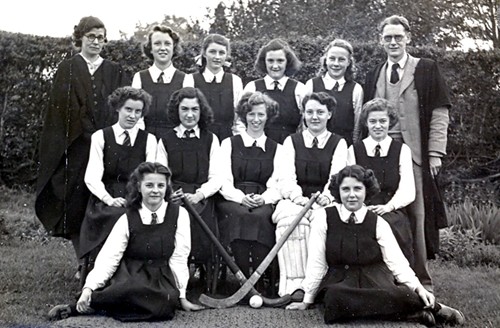
The girls' hockey first XI - that's me on the right in the
middle row
Leisure activities were a big part of my life, progressing from the
Brownies and the Girl Guides to evening classes in dancing run by a well
known Bourne character called Professor Homer. This tuition was not
popular with the headmaster of the grammar school who tried to stop pupils
from going, claiming that the evening sessions interfered with their home
work, and although there was an attempt to ban us we always managed to
sneak in. There was also a thriving youth club in the hall of the
Congregational Church in Eastgate, now the Bourne United Reformed Church,
which was attended by dozens of teenagers from the town.
When Bourne railway station closed in 1959, Dad went to work at the
Blackstone’s engineering factory in Stamford as night clinical assistant
and he stayed there until his death in 1970 at the age of 64. During this
time he was credited with saving a man’s life with his prompt action after
he had lost a limb in a terrible industrial accident. By this time, my
parents had moved to a bungalow in Alexandra Terrace.
I was married in 1954 to Raymond (Scrim) Binns and given away, of course,
by my proud Dad. Our first home was a flat above Hart’s grocery shop in
South Street where our daughter Avis was born. Scrim worked for sixteen
years at the Raymond Mays garage in Spalding Road owned by the famous
international racing star and he was often called on by Mr Mays to drive
his mother on shopping trips.
Another job was to deliver Rolls Royce cars to wealthy customers in London
and on one occasion had the privilege of being driven from Stamford to
Bourne by the Argentinian racing champion Juan Manuel Fangio, one of the
many famous friends of Mr Mays who visited Bourne in those days. He then
went to Fiat-Allis at Essendine and worked there until the factory closed
when he moved to the Christian Salvesen freezer plant at Easton.
By this time we were living at a house in Kingsway and it was here,
sadly, that Scrim died in 1999. My mother survived my Dad, living for some
years at the almshouses in West Street and later, suffering from dementia,
moved to Digby Court in Christopher’s Lane, Bourne, where she died in
1996.
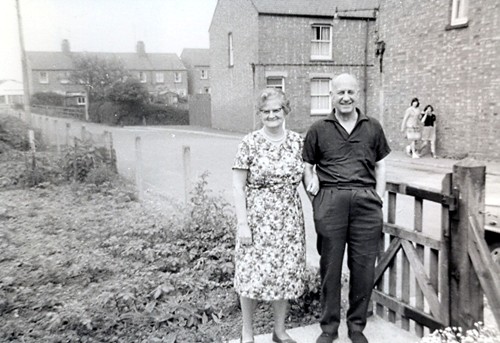
Mum and Dad at the front gate of their bungalow in Alexandra
Terrace in 1968
My own working career was varied but always rewarding. I had a job first
with the auctioneers and estate agents, Hodgkinson and Son, who had
offices in West Street, and I enjoyed attending their sales at the Corn
Exchange. Unfortunately the pay was quite poor so I moved to the Eagle
Star Insurance Company and this meant travelling to and from Peterborough
every day and even with a weekly ticket on the Delaine bus which cost 7s.
6d. (37½p in today’s money), I had managed to double my salary.
After the birth of our daughter, Avis, I worked part time in the offices
of T W Mays and Sons, the Bourne fellmongers and wool merchants, and
finally I joined South Kesteven District Council in 1971 at their offices
in Wake House where I stayed until early retirement in 1990 due to ill
health.
Today, I seem to be as busy as ever. I am a member of the Friends of Digby
Court where I also spend time as a volunteer. I also belong to Bourne
Animal Welfare and the Dyke Women’s Institute and so there is always
plenty do. I am lucky to have good friends and a lovely family of a
daughter and son in law, Tony, with three grandsons and three great
granddaughters, all based at Grantham. (Avis met Tony when he worked for
Foster’s who built the original Budgens’ supermarket in West Street and
renovated the Burghley Arms in the town centre).
I count myself fortunate in having had such great parents and to have
enjoyed a very special relationship with my Dad, a quiet and unassuming
man with a great sense of humour, and I hope he would have been proud of
me. It was never my intention to write all this but following a request
from our local historian, Rex Needle, to submit a “small article” about
early events at the Counter Drain station, like Topsy it just grew and
grew.
WRITTEN MAY 2010
See also
Counter Drain station
Tongue End
An encounter with Fangio

Go to:
Main Index Villages
Index
|
